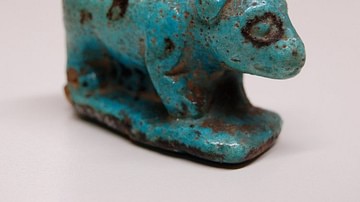Search
Search Results

Video
The History of Philosophy: Origins of Ancient Philosophy Around the Globe
In honour of World Philosophy Day on November 18th, we are bringing you an introduction to the history of philosophy, and the origins of ancient philosophy from around the world! What is philosophy you may be asking? Well, the word philosophy...

Article
Ten Norse Mythology Facts You Need to Know
The stories that make up what is known today as Norse mythology once informed the religious beliefs of the people of regions including Scandinavia and Iceland. To the Norse, the world was an enchanted place of gods, spirits, and other entities...

Article
Dogs in Ancient Egypt
The dog as "man's best friend" has a long history going back to the ages long before the civilization of ancient Egypt was established but the Egyptians were among the earliest people to recognize the value of the dog and show their appreciation...

Article
Mehrauli Archaeological Park
Mehrauli Archaeological Park is situated in Delhi, just beside the Qutb Complex (historically, Mehrauli was the first of the seven cities of Delhi). Spanning an area of more than 200 acres (80 ha), the site displays the rich heritage of India...

Definition
Ancient Persian Mythology
The mythology of ancient Persia originally developed in the region known as Greater Iran (the Caucasus, Central Asia, South Asia, and West Asia). The Persians were initially part of a migratory people who referred to themselves as Aryan...

Definition
Trinity
The Christian doctrine of the Trinity (from the Latin trinus, meaning "threefold") professes that there is one God, but three eternal and consubstantial persons (aspects): the Father, the Son, and the Holy Spirit. The Father is the God of...

Definition
Hel
Hel is the queen of the afterlife realm of Hel in Norse mythology. She is the daughter of the god Loki and giantess Angrboda and sister of Fenrir the wolf and Jörmungandr the World Serpent. Although often referenced as a goddess, Hel is more...

Definition
Samhain
Samhain (pronounced “SOW-in” or “SAH-win”), was a festival celebrated by the ancient Celts halfway between the autumn equinox and the winter solstice. It began at dusk around October 31st and likely lasted three days. Samhain marked the transition...

Definition
Ridda Wars
The Ridda Wars or the Wars of Apostasy (632-633 CE) were a series of military engagements between the armies of the Rashidun Caliphate (632-661 CE) and the renegade tribes of Arabia. The rebels had renounced their allegiance with the nascent...

Definition
Sif
Sif is a fertility goddess in Norse mythology, wife of the thunder god Thor, best known for the story in which the trickster god Loki cuts her hair as a prank and is forced to replace it with a magical headpiece, leading to the creation of...